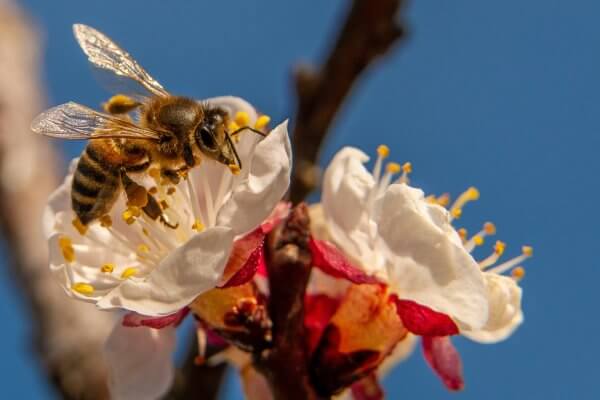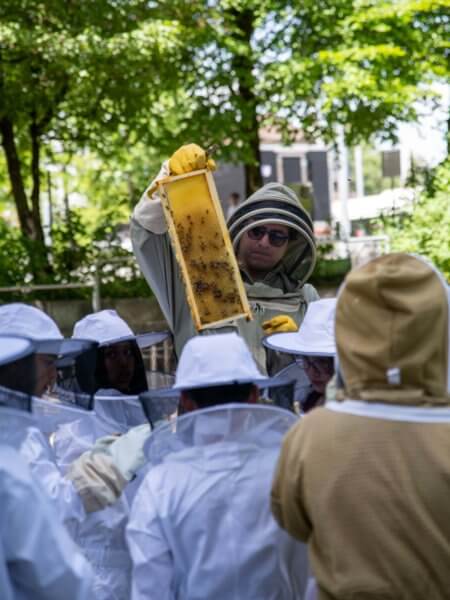In the summer of 2022, Equestrio Foundation decided to support the initiative “Today, we sow “, organised by the Geneva association APIDAE. It consisted in the distribution of packets of honey plant seeds to schoolchildren in Geneva in order to raise their awareness about the vital role of bees in our ecosystem. Zoom on a funding directed 100% towards the new generations.
Don’t you dare touch a bee!
There was a time when bees were perceived as harmful or even dangerous. Times have changed. They are now respected, promoted, protected and heralded as an emblem of the decline in biodiversity. One could even actually say that these delicate striped insects are quite ironically enjoying their moment of glory. Let’s just hope it’s not too late…
In a world marked by the rising ecological awareness of the young generations, it is very likely that many toddlers have made their parents realise that bees are paramount to not only the environment but also to their very own lives and future. Because yes, we need bees badly and we must be there for them as they need us badly too.
Love is (should be) in the air
Bees play a key role in our ecosystem and are indispensable to the preservation of biodiversity and the very future of mankind. But how can such a tiny insect hold so much power?
The guardians of our biodiversity and food supply
In addition to making honey, bees are great pollinators. They create life.
They are the ones who work hard to transport the pollen that is essential to the fertilisation and growth of the fruit and vegetables we eat. In addition to food production, pollination also plays a major role in nurturing the richness of nature by allowing the reproduction of wild flowers, trees and plants…which are themselves in turn essential to the survival of other animals, plants…the famous chain that must not be broken.
The architects of a fragile balance
According to Greenpeace, bees contribute to no less than 75%[1] of the world’s food production. Their decline is therefore a particularly worrying prospect when considering the exponential growth in the global population. In the wake of the disappearance of certain types of food, it should also be pointed out that a whole strand of agricultural activity would collapse and, with it, millions of sources of income.
In short, as you will have understood, they provide us with a vital and irreplaceable service (the economic value of which, by the way, is estimated at around €153[2] billion per year, or the equivalent of Portugal’s GDP).
But what on earth have humans not understood?
And yet… In 20 years, 80%[3] of insects have disappeared in Europe. A veritable hecatombe and a consequence of all the damages imposed on nature by human activity. This is yet another blatant example of the sixth mass extinction that is taking place before our not-so-powerless eyes.
Bees are being hit hard by climate change, intensive agriculture, pesticides that attack their nervous system, and the accidental importation of predators such as Varroa mites (an Asian mite that attaches itself to the backs of bees and rapidly migrates under their abdomens to consume them alive).
What can be done about this alarming situation? We must take action, of course! By respecting, helping and protecting bees if we don’t want to become “bird men” and pollinate our trees by hands as is already the case in certain regions of China. Because, we all know this: nothing will ever replace the fabulous miracle of Nature.

Equestrio Foundation’s action for bees
At Equestrio Foundation, we have chosen to support financially the “Today, we sow” operation, organised by APIDAE every summer since 2019. The summer season is indeed particularly critical for bees as they struggle to find food. The Geneva-based association has come up with the excellent idea of giving them a hand by distributing to the canton of Geneva schoolchildren packets filled with seeds of melliferous plants that provide the nectar essential to their survival.
Our funding amounted to CHF 14,516, which was used towards the creation and shipping of the kits. APIDAE used half of this donation in 2021 and the remaining funds will be allocated to the 2022 operation.
Raising awareness among the younger generations
We have been won over by this concrete and local initiative that encourages the younger generations to sow the seeds of their future.
Through this project, children are made aware by their teachers of the importance of protecting biodiversity and respecting the living world. Above all, they come to realise that they can take concrete action and make a difference, at their very own level, through simple gestures accessible to all, such as planting a few seeds.
Every action counts, yours too. Do not hesitate to support this project. Time flies, Summer 2023 is not so far away and bees will still need us – even if we hope dearly that one day they will fly and flourish freely again!

[1] Greenpeace report – 2016
[2] Greenpeace report – 2016
[3] https://www.apidae.ch/
